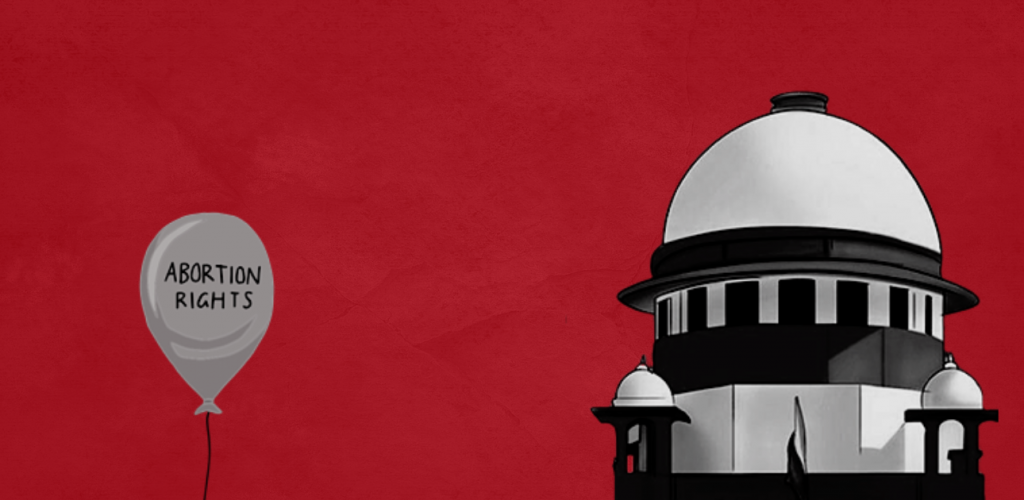By Rohin Bhatt
When the Delhi High Court dismissed the matter of X versus. The Principal Secretary, Health and Family Welfare Department, I was apprehensive that this case would end in disappointment and result in a situation which is similar to what is happening after the United States Supreme Court’s recent decision in Dobbs versus Jackson Women’s Health Organization (2022) in the U.S. In an earlier piece for The Leaflet around this decision, I ended with the following question — “to what length must a woman have to go in order to protect her fundamental right of bodily autonomy under Article 21 [of the Constitution]?”
The Supreme Court of India, in appeal, has answered my question affirmatively in favour of the womanhood. On the International Safe Abortion Day, a three-judge bench of the Supreme Court emphatically held that all women are entitled to safe and accessible abortions in India.
The purpose of this piece is to not just analyse the decision but also contextualise it in the broader framework of access to abortion in India.
But first, the most important question. Since the Medical Termination of Pregnancy Act, 1971 (‘MTP Act’) frames the rights under it for ‘women’, judgments on the subject thus far had covered only cis-women. However, the bench has, in no uncertain terms, held that while it used the term ‘women’ in the judgement, it included all persons who could get pregnant above and beyond the already existing mandate of cisgender women.
This is a massive expansion of the existing jurisprudence to include protection to trans, non-binary, and gender non-confirming persons, who had previously lamented being left out of the scope of the MTP Act, and faced serious discrimination. The court held, “we use the term “woman” in this judgment as including persons other than cis-gender women who may require access to safe medical termination of their pregnancies.”
While the ground reality may be hard to change and will undoubtedly take time, this is a first step in the right direction.
The court also took judicial notice of two major social barriers to reproduction — registered medical practitioners’ (‘RMP’) fear of prosecution, and the social stigma around abortions.
The court held that though actions done in good faith under the MTP Act are protected under Section 8, the actions of RMPs to lay down extra-legal requirements to abortion, such as consent from the woman’s family, documentary proofs, or judicial authorisation, have a chilling effect which lead women to seek unsafe abortion or approach the courts. Though the court further held that the issue of criminalisation casts a chilling effect on the willingness of RMPs to perform abortion, this, I argue, has in turn, a chilling effect on reproductive autonomy of the women.
Reiterating that it is only the women’s consent that is to be taken into account while performing an abortion, the Supreme Court held that RMPS should refrain from imposing extra-legal conditions on people seeking abortion.
The second issue is the court did not only acknowledge that there is a stigma around pre-marital sex and abortions, but also passed a series of guidelines to the State to ensure safe abortions. The guidelines are, inter alia:
- The state must ensure that information regarding reproduction and safe sexual practices is disseminated to all parts of the population.
- Further, it must see to it that all segments of society are able to access contraceptives to avoid unintended pregnancies and plan their families.
- Medical facilities and RMPs must be present in each district and must be affordable to all.
- The government must ensure that RMPs treat all patients equally and sensitively. Treatment must not be denied on the basis of one’s caste or due to other social or economic factors.
Studies have long shown how factors such as education, socio-economic factors, geographic location, and so on are determinative in access to abortion. The court has, for the first time, recognised social and economic determinants of health, and directed the State to take care to ensure not just the elimination of such determination, but also ensure affordable care and contraceptives.
However, it must also be kept in mind that presently, 33 per cent of the population does not use any contraceptive measure, and female sterilisation is the most popular contraceptive measure among women, with 38 per cent married women and 21 per cent unmarried women resorting to it to avoid unwanted pregnancies, according to the National Family Health Survey, 2019-21. The Survey also noted that, “Older women, women in rural areas, women with little or no schooling, Muslim women, scheduled tribe women, and women in the two lowest wealth quintiles have less exposure to family planning messages.”
The court’s directions must be followed, and sex education must be widespread if we are to tackle the issues around abortion.
Another important observation that the court makes is: “… [S]ignificant reliance ought to be placed on each woman’s own estimation of whether she is in a position to continue and carry to term her pregnancy.” So far, it was medical boards whose opinion carried primacy. As a study by the Centre for Justice, Law, and Society (‘CJLS’), a multidisciplinary research centre at the Jindal Global Law School noted, “These Boards are unconstitutional and violate the fundamental rights of pregnant persons by subjecting them to multiple invasive examinations and causing unnecessary delays in the termination process.”
While the judgement does not outlaw the medical boards, it still marks a beginning of the end of medical boards, and truly begins a sojourn towards a rights-based framework. It reiterates the primacy of the opinion and the decision of the woman in her ability to raise her child by grounding it in firm jurisprudence of privacy and dignity.
It is pertinent to know that the MTP Act carves out exceptions for rape, sexual assault and incest by extending the timelines for unwelcome pregnancies for these crimes. The court has, in a significant ruling, held that rape within the meaning of Rule 3B of the Medical Termination of Pregnancy Rules, 2003 includes marital rape, and taken cognisance of intimate partner violence.
This is a significant step ahead, and while marital rape may not be criminalised yet (though the challenges are pending before the Supreme Court), the court has nudged the jurisprudence around marital rape in the direction of criminalisation without actually expressing any opinion on the same
By holding that the MTP and POCSO Acts should be read harmoniously, the court seems to have done away with mandatory reporting and held that RMPs are not duty bound to disclose identities of their patients.
Abortion is a multi-faceted issue, and it needs to be tackled through various measures. The end goal of the reproductive rights movement qua abortion must be decriminalisation of abortion, and access to safe, affordable contraceptives and abortion services for everyone.
This judgment, while giving us cause to celebrate the restoration of privacy, dignity and autonomy to the forefront of the right of pregnant persons over their own body, and bringing in an inclusive approach to abortion, cannot be the cause to stop fighting for equal rights over our bodies. As the CJLS study shows, we still do not have enough radiologists, obstetricians-gynaecologists and paediatricians in India for women, their children and abortions.
Abortion in India needs to be overhauled both legally and socially. It is still a crime to perform a medical termination outside the scope of the MTP Act. As British development and marketing professional Jessie Macneil Brown said, “States and others must end attempts to control the choices of women and girls. The right to make informed decisions about our sexual and reproductive health is a human right, and must be guaranteed rather than undermined and criminalised. (IPA Service)
Courtesy: The Leaflet

 Corporate Hospitals Are Fleecing Common Patients By Overcharging
Corporate Hospitals Are Fleecing Common Patients By Overcharging 